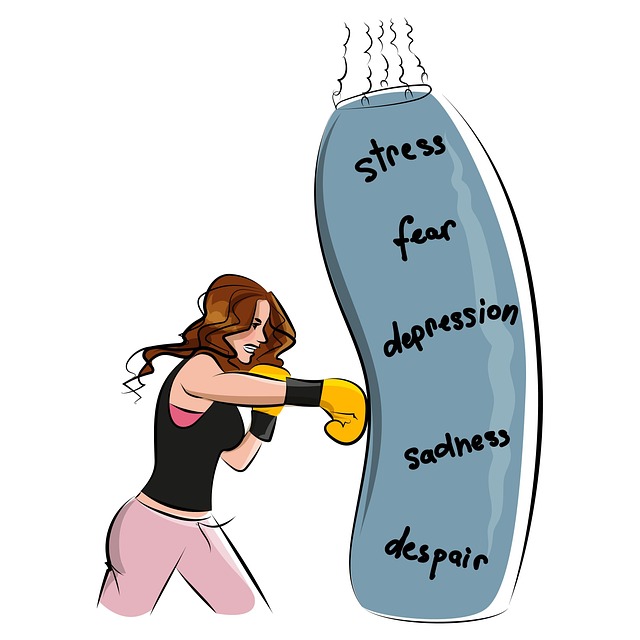Denver Exposure and Response Prevention (D-ERP) therapy is a cognitive behavioral approach that combines exposure therapy with response prevention to modify maladaptive behaviors and thinking related to trauma, phobias, anxiety, and depression. By gradually exposing clients to triggers while preventing avoidance, D-ERP fosters resilience and positive thought patterns. Integrating mindfulness meditation and positive thinking exercises into sessions enhances well-being and mental health management, empowering individuals to challenge negative beliefs and replace them with adaptive thoughts throughout their therapeutic journey.
“Unleash the power of positive thinking with Denver Exposure and Response Prevention (D-ERP) Therapy, a game-changing approach to mental health treatment. This therapeutic technique combines exposure therapy with cognitive reframing exercises to challenge negative thought patterns. By understanding D-ERP, individuals can effectively incorporate positive thinking into their daily routines. This article explores how to seamlessly integrate these exercises, highlighting the numerous benefits of cultivating optimism in overcoming various mental health challenges.”
- Understanding Denver Exposure and Response Prevention Therapy (D-ERP)
- How to Incorporate Positive Thinking Exercises into D-ERP
- Benefits of Positive Thinking in Overcoming Mental Health Challenges
Understanding Denver Exposure and Response Prevention Therapy (D-ERP)

Denver Exposure and Response Prevention Therapy (D-ERP) is a highly effective form of cognitive behavioral therapy that focuses on helping individuals confront and manage their fears and anxieties in a safe, controlled environment. This innovative approach combines exposure therapy with response prevention techniques to modify maladaptive behaviors and thinking patterns associated with trauma, phobias, anxiety disorders, and depression. D-ERP facilitates the development of coping strategies by encouraging patients to gradually expose themselves to triggers while preventing them from resorting to avoidance or safety behaviors.
By understanding one’s fears and the responses that accompany them, mental health professionals can facilitate a profound shift in how individuals perceive and interact with their triggers. This therapy empowers people to challenge negative thought patterns and replace them with more realistic, positive ones. Through D-ERP, clients learn mind over matter principles, fostering resilience and enhancing overall well-being. A thorough risk assessment is crucial before implementing this therapy, ensuring safety and effective depression prevention strategies throughout the process.
How to Incorporate Positive Thinking Exercises into D-ERP

Integrating positive thinking exercises into Denver Exposure and Response Prevention (D-ERP) therapy offers a powerful approach to enhancing well-being and managing mental health challenges. D-ERP, known for its effectiveness in treating anxiety and phobias, can be further enriched by incorporating strategies that foster positive thought patterns. One practical way is to start sessions with a brief mindfulness meditation practice, encouraging clients to focus on the present moment and cultivate a sense of calm. This sets the stage for more effective exposure exercises, where individuals confront fears in a controlled environment while maintaining a positive mindset.
Additionally, self-esteem improvement techniques can be woven into D-ERP. By combining cognitive restructuring with exposure therapy, clients challenge negative beliefs about themselves and replace them with more adaptive, positive thoughts. This process empowers them to engage in the exposure exercises with enhanced confidence. Similarly, coping skills development through positive thinking can equip individuals with valuable tools to manage anxiety and stress, making their overall therapeutic journey smoother and more successful.
Benefits of Positive Thinking in Overcoming Mental Health Challenges

Positive thinking has emerged as a powerful tool in overcoming mental health challenges, offering a beacon of hope for individuals navigating difficult emotional landscapes. By fostering a mindset focused on optimism and resilience, it becomes an integral part of therapeutic processes such as Denver Exposure and Response Prevention Therapy (ERP). This approach encourages individuals to confront fears and negative thoughts head-on, replacing them with more adaptive and positive beliefs.
In the context of mental health professional practice, integrating positive thinking into treatment plans can significantly enhance outcomes. Effective risk management planning for mental health professionals involves cultivating emotional intelligence and cultural competency training among healthcare providers. This ensures that therapists create supportive environments, encouraging clients to develop coping strategies that build resilience, improve mood, and promote overall well-being.
Implementing positive thinking exercises within Denver Exposure and Response Prevention (D-ERP) therapy offers a powerful approach to overcoming mental health challenges. By combining cognitive strategies with positive affirmations, individuals can effectively navigate fears and reduce avoidance behaviors. The benefits are profound, fostering resilience, improving emotional well-being, and enhancing overall quality of life. This integrated method encourages individuals to challenge negative thoughts, build self-confidence, and develop a more adaptive and optimistic mindset, ultimately leading to lasting mental health improvements.














